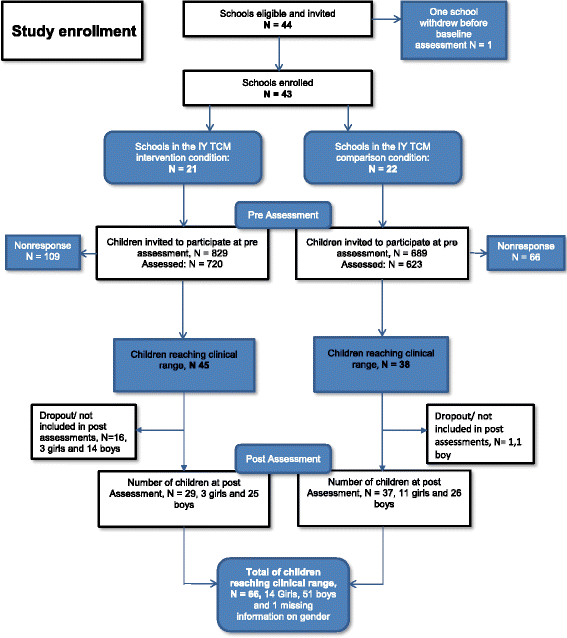Does the Incredible Years Teacher Classroom Management Training programme have positive effects for young children exhibiting severe externalizing problems in school?: a quasi-experimental pre-post study
- PMID: 27782826
- PMCID: PMC5080773
- DOI: 10.1186/s12888-016-1077-1
Does the Incredible Years Teacher Classroom Management Training programme have positive effects for young children exhibiting severe externalizing problems in school?: a quasi-experimental pre-post study
Abstract
Background: Young children exhibiting severe externalizing problems in school are at risk of developing several poor outcomes. School-based intervention programs have been found to be effective for students with different problems, including those with behavioral problems, emotional distress, or social problems. The present study investigated whether the IY-TCM programme, as a universal stand-alone school intervention programme, reduced severe child externalizing problems as reported by the teacher, and evaluated if these children improved their social competence, internalizing problems, academic performances and student- teacher relationship as a result of the IY TCM training.
Methods: A quasi-experimental pre-post study was conducted, including 21 intervention schools and 22 control schools. Children in 1st - 3rd grade (age 6-8 years) assessed by their teacher as having severe externalizing problems on the Sutter-Eyberg Student Behavior Inventory-Revised (SESBI-R) total Intensity score, were included in the study, N = 83 (65 boys and 18 girls). Treatment effects were evaluated using 3- level linear mixed models analysis.
Results: In our study we found no differences in change between the two conditions from baseline to follow-up in externalizing problems, social skills, internalizing problems and closeness with teacher. The intervention condition did however show advantageous development in terms of student-teacher conflicts and increased academic performances.
Conclusion: The IY Teacher Classroom Management program is not sufficient being a stand-alone universal program in a Norwegian primary school setting, for students with severe externalizing problems. However; some important secondary findings were found. Still, young school children with severe externalizing problems are in need of more comprehensive and tailored interventions.
Keywords: IY TCM; Norway; School universal intervention; Severe externalizing problems; Teacher assessment; Young school children.
Similar articles
-
Does the Incredible Years Teacher Classroom Management programme improve child-teacher relationships in childcare centres? A 1-year universal intervention in a Norwegian community sample.Eur Child Adolesc Psychiatry. 2020 May;29(5):625-636. doi: 10.1007/s00787-019-01387-5. Epub 2019 Aug 8. Eur Child Adolesc Psychiatry. 2020. PMID: 31396707
-
Effects of a universal classroom management teacher training program on elementary children with aggressive behaviors.Sch Psychol. 2020 Mar;35(2):128-136. doi: 10.1037/spq0000351. Epub 2020 Jan 9. Sch Psychol. 2020. PMID: 31916789 Clinical Trial.
-
Preventing conduct problems and improving school readiness: evaluation of the Incredible Years Teacher and Child Training Programs in high-risk schools.J Child Psychol Psychiatry. 2008 May;49(5):471-88. doi: 10.1111/j.1469-7610.2007.01861.x. Epub 2008 Jan 21. J Child Psychol Psychiatry. 2008. PMID: 18221346 Free PMC article. Clinical Trial.
-
Systematic Review and Meta-analysis of Parent Group Interventions for Primary School Children Aged 4-12 Years with Externalizing and/or Internalizing Problems.Child Psychiatry Hum Dev. 2018 Apr;49(2):244-267. doi: 10.1007/s10578-017-0745-9. Child Psychiatry Hum Dev. 2018. PMID: 28699101
-
The relation between behavioral problems and social competence: A correlational Meta-analysis.BMC Psychiatry. 2019 Nov 9;19(1):354. doi: 10.1186/s12888-019-2343-9. BMC Psychiatry. 2019. PMID: 31706279 Free PMC article.
Cited by
-
A Meta-Analysis of the Current State of Evidence of the Incredible Years Teacher-Classroom Management Program.Children (Basel). 2021 Dec 30;9(1):24. doi: 10.3390/children9010024. Children (Basel). 2021. PMID: 35053649 Free PMC article.
-
The effectiveness and cost-effectiveness of the Incredible Years® Teacher Classroom Management programme in primary school children: results of the STARS cluster randomised controlled trial.Psychol Med. 2019 Apr;49(5):828-842. doi: 10.1017/S0033291718001484. Epub 2018 Jul 18. Psychol Med. 2019. PMID: 30017006 Free PMC article. Clinical Trial.
References
-
- Achenbach TM, Rescorla LA. Manual for the ASEBA school-age forms & profiles. Burlington: University of Vermont, Research Center for Children, Youth, & Families; 2001.
-
- Webster-Stratton C, Reid MJ. Strengthening social and emotional competence in young children - the foundation for early school readiness and success - Incredible Years classroom social skills and problem-solving curriculum. Infant Young Child. 2004;17(2):96–113. doi: 10.1097/00001163-200404000-00002. - DOI
MeSH terms
LinkOut - more resources
Full Text Sources
Other Literature Sources
Medical
Miscellaneous


